|
LIST
Alexander
Graham Bell (18471922) invented the telephone, was a
scientist, and engineer.
George
Antheil (19001959) was an American avant-garde composer,
pianist, author, endocrinologist, and inventor.
Gregory
Bateson (19041980) was a British anthropologist,
sociologist, semiotician, linguist, and cyberneticist.
Imhotep (26502611 BC), Egyptian chancellor,
physician, and architect.
Pythagoras (580490 BC), Greek mathematician,
philosopher, and scientist. The term philosophy means "love of wisdom." It
was an essential definition advanced by Pythagoras.
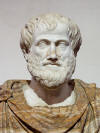 Aristotle
(384322 BC), Greek philosopher, a student of Plato, and
teacher of Alexander the Great. His fields of expertise
include: physics, metaphysics, poetry, theater, music,
logic, rhetoric, politics, ethics, biology, and zoology. He
numbers among the greatest polymaths of all time. Aristotle
(384322 BC), Greek philosopher, a student of Plato, and
teacher of Alexander the Great. His fields of expertise
include: physics, metaphysics, poetry, theater, music,
logic, rhetoric, politics, ethics, biology, and zoology. He
numbers among the greatest polymaths of all time.
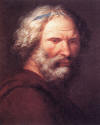
Archimedes
(c.287c.212 BC), Greek mathematician, physicist, engineer,
inventor, and astronomer.
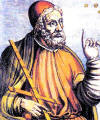 Claudius
Ptolemy (90 168 AD) was a scienttist, mathematician,
astronomer, geographer, and poet. He lived in Egypt under
Roman rule, and is credited for the Geocentric theory where
the Earch is in the center of the solar system. Claudius
Ptolemy (90 168 AD) was a scienttist, mathematician,
astronomer, geographer, and poet. He lived in Egypt under
Roman rule, and is credited for the Geocentric theory where
the Earch is in the center of the solar system.
Zhang Heng (78-139), Han
Dynasty Chinese politician, historian, philosopher, poet,
mathematician, astronomer, geographer, cartographer,
painter, sculptor, and inventor. He invented the seismometer
to detect earthquakes.
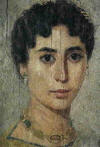
Hypatia
(350 ? - 415 AD) was a Greek mathematician, philosopher, and
astronomer. She lived in Egypt, and was killed by a
Christian mob.
Jābir ibn Hayyān (Geber)
(721815) Persian (or Arab) Muslim chemist, alchemist,
astronomer, engineer, pharmacist, physician, philosopher,
physicist, and scientist, He wrote 300 books on philosophy,
1,300 books on mechanical devices and military machinery,
and hundreds of books on alchemy.
Al-Khwarizmi (c. 780850),
Persian mathematician, astronomer, and geographer.
Ziryab (789-857), Iraqi
poet, musician, singer, cosmetologist, fashion designer,
astronomer, botanist, and geographer.
Al-Kindi (Alkindus) (801873), Arab astronomer, geographer,
mathematician, meteorologist, musician, philosopher,
physician, physicist, scientist, and politician. He wrote
265 treatises.
Muhammad ibn Zakariya Razi (Rhazes) (865925), Persian
physician, alchemist, chemist, and philosopher.
Abhinavagupta (9751025),
Indian philosopher, literary critic, musician, poet,
dramatist, dancer, and logician,
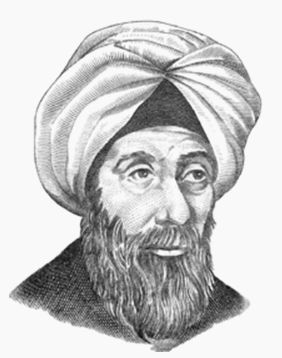
Ibn al-Haytham (Alhazen) (9651039), an Iraqi scientist,
physicist, anatomist, physician, psychologist, astronomer,
engineer, inventor, mathematician, ophthalmologist,
philosopher, and theologian.
He was one of the first to formulate the
scientific method. Alhazen's method combined mathematics,
induction, observation, and experimentation. You can observe
this in his work on optics. The emission theory held that
the eyes emit rays of light. The intromission theory held
that objects reflect or emit physical particles that enter
the eyes. Alhazen proved that both theories were incorrect.
His theory, the intromission theory of vision, demonstrated
that light travels in straight lines (even through
transparent bodies), is reflected off objects, and enter the
eye.
Abū Rayhān al-Bīrūnī (9731048), Persian scientist,
physicist, anthropologist, astronomer, astrologer,
encyclopedist, geographer, geologist, historian,
mathematician, pharmacist, physician, and philosopher. He
introduced Indian scientific knowledge & thought to the
Middle East & the West.
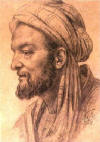 Avicenna
(9801037), Persian astronomer, chemist, geologist,
logician, paleontologist, mathematician, physicist, poet,
psychologist, and scientist. He wrote almost 450. He is
known as the father of modern medicine. He is also
considered the father of the fundamental concept of momentum
in physics. Avicenna
(9801037), Persian astronomer, chemist, geologist,
logician, paleontologist, mathematician, physicist, poet,
psychologist, and scientist. He wrote almost 450. He is
known as the father of modern medicine. He is also
considered the father of the fundamental concept of momentum
in physics.
Ibn Hazm (9941064),
Andalusian-Arab polymath. He wrote over 400 works on
jurisprudence, logic, history, ethics, comparative religion,
theology, The Ring of the Dove, and the art of love.
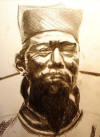 Shen
Kuo (10311095), Chinese scientist, statesman,
mathematician, astronomer, meteorologist, geologist,
zoologist, botanist, pharmacologist, agronomist,
encyclopedist, poet, general, diplomat, hydraulic engineer,
and inventor. Shen
Kuo (10311095), Chinese scientist, statesman,
mathematician, astronomer, meteorologist, geologist,
zoologist, botanist, pharmacologist, agronomist,
encyclopedist, poet, general, diplomat, hydraulic engineer,
and inventor.
Omar Khayyαm (10481131),
Persian poet, writer, astronomer, mathematician, physicist,
and philosopher.
Acharya Hemachandra
(10891172), Indian poet, linguist, grammarian, historian,
and philosopher.
Nasir al-Din al-Tusi (Tusi)
(12011274), Persian writer, astronomer, biologist, chemist,
mathematician, philosopher, logician, physician, historian,
physicist, and scientist. He was one of the greatest
scientists of the thirteenth century.
Ibn al-Nafis (12131288),
Arab physician, anatomist, biologist, physiologist,
ophthalmologist, lawyer, philosopher, logician, novelist,
psychologist, scientist, science fiction writer, astronomer,
cosmologist, geologist, linguist, historian, and
sociologist.
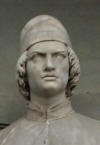 Leon
Battista Alberti (14041472), Italian Renaissance author,
artist, architect, poet, priest, linguist, philosopher, and
cryptographer. Leon
Battista Alberti (14041472), Italian Renaissance author,
artist, architect, poet, priest, linguist, philosopher, and
cryptographer.
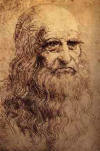 Leonardo
da Vinci (14521519) Italian Renaissance painter, inventor,
engineer, astronomer, anatomist, biologist, geologist,
physicist, and architect. Leonardo
da Vinci (14521519) Italian Renaissance painter, inventor,
engineer, astronomer, anatomist, biologist, geologist,
physicist, and architect.
Mαrio
Raul de Morais Andrade (18931945) was a Brazilian poet,
novelist, musicologist, art historian, critic, and
photographer.
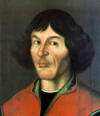 Nicolaus
Copernicus (14731543), Polish Renaissance astronomer,
mathematician, physician, artist, classical scholar,
translator, economist, governor, military leader, and
diplomat. Nicolaus
Copernicus (14731543), Polish Renaissance astronomer,
mathematician, physician, artist, classical scholar,
translator, economist, governor, military leader, and
diplomat.
He formulated the
heliocentric cosmology where the Earth spins, and
revolves around the Sun. This marks the beginning of modern
astronomy. It's referred to as the Copernican Revolution -
no pun intended.
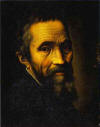 Michelangelo
di Lodovico Buonarroti Simoni (14751564), Italian
Renaissance painter, sculptor, architect, poet, and
engineer. Michelangelo
di Lodovico Buonarroti Simoni (14751564), Italian
Renaissance painter, sculptor, architect, poet, and
engineer.
Matrakηı Nasuh (? - 1564)
Muslim mathematician, historian, geographer, cartographer,
calligrapher, artist, and engineer.
Gerolamo Cardano (1501-1576), Italian mathematician and
inventor.
Matteo Ricci (1552-1610),
Italian Jesuit, mathematics, literature, philosophy, poetry,
mechanics, and astronomy.
Akbar the Great (15421605), Indian Mughal emperor,
architect, artisan, artist, blacksmith, engineer, general,
inventor, and writer.
Xu Guangqi (15621633), Chinese bureaucrat, agriculturalist,
astronomer, and mathematician of the Ming Dynasty.
Athanasius Kircher (1601- ?), music, Egyptology, and botany.
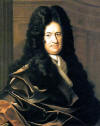 Gottfried
Leibniz (16461716), German philosopher, logician,
mathematician, scientist, historian, and mechanics. Gottfried
Leibniz (16461716), German philosopher, logician,
mathematician, scientist, historian, and mechanics.
He invented calculus at the same time as
Newton, and it's his notation that we use today. In logic he
created the binary system used in computers. In physics he
anticipated Einstein; his theory of motion saw space as
relative.
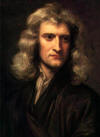
Sir
Isaac Newton (16431727) English physicist, mathematician,
astronomer, and alchemist. His 1687 publication of the
Principia is one of the most influential books in science.
It is in this work that Newton described gravitation and the
three laws of motion.
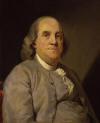
Benjamin
Franklin (17061790), American politician, author, printer,
scientist, and inventor. He invented the wood
burning stove and bifocals.
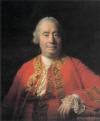
David Hume
(17111776) was a Scottish philosopher, historian,
economist, and essayist. He is the most important and
consistent empiricist philosopher.
Mikhail Lomonosov
(17111765), writer, historian, artist, poet, physicist,
chemist, and scientist. He discovered the atmosphere of
Venus.
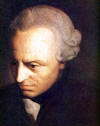 Immanuel
Kant (17241804) was a German philosopher. His other areas
of interest were logic, theology, mathematics, physics,
geography, anthropology, law, and history. Immanuel
Kant (17241804) was a German philosopher. His other areas
of interest were logic, theology, mathematics, physics,
geography, anthropology, law, and history.
His Critique of Pure Reason is one of the most important
works in philosophy. It encompasses an attack on traditional
metaphysics and epistemology, and highlights Kant's own
contribution to these areas. The other main works of his
maturity are the Critique of Practical Reason, which
concentrates on ethics, and the Critique of Judgment, which
investigates aesthetics and teleology.
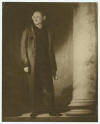 Thomas
Jefferson (17431826), American politician, horticulturist,
architect, archaeologist, paleontologist, and inventor. He
was the 3rd President of the United States, the principal
author of the Declaration of Independence (1776), and the
founder of the University of Virginia. Thomas
Jefferson (17431826), American politician, horticulturist,
architect, archaeologist, paleontologist, and inventor. He
was the 3rd President of the United States, the principal
author of the Declaration of Independence (1776), and the
founder of the University of Virginia.
Johann Wolfgang von Goethe
(17491832) German Poet, Novelist, Playwright,
scientist, philosopher, and Diplomat.
Samuel Taylor Coleridge
(17721834), English poet, critic, and philosopher. He
coined the phrase suspension of disbelief. Coleridge was
bipolar, and an opium addict.
Thomas Young (17731829),
English polymath who made notable contributions to the
fields of vision, light, solid mechanics, energy,
physiology, language, musical harmony, and Egyptology.
Ernst
Haeckel (18341919), was a German naturalist, philosopher,
physician, and artist. He discovered and named thousands of
new species.
view work
Jose Rizal (18611896), Filipino ophthalmologist, poet,
journalist, novelist, volcanologist, biologist, political
scientist, painter, and polyglot.
Edward Heron-Allen (18611943), Lawyer, writer, violin
builder, marine zoologist, meteorologist, historian,
archaeologist, Buddhist philosopher.
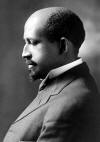
W.
E. B. Du Bois (18681963)
was an author, sociologist,
historian, economist, and civil rights activist. He was the
first African American to graduated from Harvard University
where he earned his PhD in History. He was a professor of
history and economics at Atlanta University, the head of the
NAACP in 1910, founder, and editor of the NAACP's journal
The Crisis.
Read:
The Souls of Black
Folk
Walter Russell (18711963) painter, sculptor,
architect, philosopher, and physicist.
He believed mediocrity is
self-inflicted, and genius is self-bestowed.
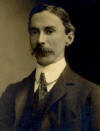 Bertrand
Russell (18721970) was a British philosopher, logician,
mathematician, historian, pacifist, and social critic. In
1950 he was awarded the Nobel Prize in Literature. Bertrand
Russell (18721970) was a British philosopher, logician,
mathematician, historian, pacifist, and social critic. In
1950 he was awarded the Nobel Prize in Literature.
Charles Burgess Fry (18721956), English politician,
publisher, teacher, writer, and athlete. He held the world
record for the long jump.
Albert Schweitzer (18751965), German theologian,
philosopher, musician, physician, humanitarian, and
activist. He won the 1952 Nobel Peace Prize, and spent the
last years of his life campaigning against nuclear weapons.
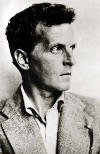 Ludwig
Wittgenstein (18891951), Austrian-British philosopher,
logician, mathematician, architect, aeronautical engineer,
and musician. Wittgenstein is one of the greatest
philosopher of the 20th century. He inspired logical
positivism and the philosophy of language. Ludwig
Wittgenstein (18891951), Austrian-British philosopher,
logician, mathematician, architect, aeronautical engineer,
and musician. Wittgenstein is one of the greatest
philosopher of the 20th century. He inspired logical
positivism and the philosophy of language.
Jean Cocteau (18891963), French poet, novelist, artist,
filmmaker, dramatist, designer, boxing manager, ballet
scenarist, illustrator, and playwright.
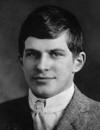 William
James Sidis (18981944), Russian-Jewish child prodigy. He
wrote on mathematics, cosmology, psychology, Native American
history, and public transportation. "His sister, Helena,
said of him that he could learn a new language in one day. William
James Sidis (18981944), Russian-Jewish child prodigy. He
wrote on mathematics, cosmology, psychology, Native American
history, and public transportation. "His sister, Helena,
said of him that he could learn a new language in one day.
Andrι Malraux (19011976),
French novelist, art historian, adventurer, and politician.
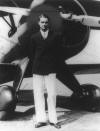 Howard
Hughes, Jr. (1905 1976), American aviator, engineer,
industrialist, film producer, film director, philanthropist,
and one of the wealthiest people in the world. Howard
Hughes, Jr. (1905 1976), American aviator, engineer,
industrialist, film producer, film director, philanthropist,
and one of the wealthiest people in the world.
Hughes set multiple world
air-speed records, and expanded Trans World Airlines. Hughes
was an eccentric obsessivecompulsive.
John von Neumann
(19031957), Hungarian American physicist, mathematician,
contributions to game theory, economics, pioneering computer
scientist.
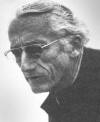 Jacques-Yves
Cousteau (19101997), French oceanographer, naval officer,
explorer, ecologist, filmmaker, scientist,
photographer, author, and inventor. He co-developed the
aqua-lung. Jacques-Yves
Cousteau (19101997), French oceanographer, naval officer,
explorer, ecologist, filmmaker, scientist,
photographer, author, and inventor. He co-developed the
aqua-lung.
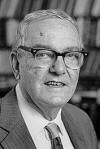 Herbert
Simon (19162001), American political scientist,
psychologist, computer science, philosophy of science, a
leader in artificial intelligence, and Nobel Prize winner in
Economics. He wrote almost a thousand publications. Herbert
Simon (19162001), American political scientist,
psychologist, computer science, philosophy of science, a
leader in artificial intelligence, and Nobel Prize winner in
Economics. He wrote almost a thousand publications.
George
Price (19221975) was an American mathematician, chemist,
and geneticist, biologist, and science journalist. He he
committed suicide after giving all his possessions to the
poor.
Desmond Morris (1928 - ), British zoologist, painter, and
author.
Naquib Al-Attas (1931 - ), Islamic philosophy, metaphysics,
theology, education, art, architecture, and military
science.
Jonathan Miller (born 1934), British theatre and opera
director, author, television presenter, sculptor, and
doctor.
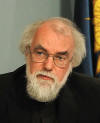 Rowan
Williams (1950 -), Archbishop of Canterbury, theologian,
poet, and speaks 12 languages, . Rowan
Williams (1950 -), Archbishop of Canterbury, theologian,
poet, and speaks 12 languages, .
Views on creationism:
His believes that creationism should not be taught in
schools as an alternative to evolution. He said, "I think
creationism is, in a sense, a kind of category mistake, as
if the Bible were a theory like other theories
, it's not
what it's about."
Julie
Taymor (1952 - ) is an American director, actor, set
designer, costume designer, and puppeteer. She has two Tony
Awards, the Drama Desk Award for Outstanding Costume Design,
an Emmy Award, and an Academy Award nomination for Original
Song.
Jamie
Foxx / Eric Marlon Bishop (1967 - ), is an American actor,
comedian, singer, and pianist. He won an Academy Award (Best
Actor) for his performance in Ray. He's a Grammy Award
winning musician (Unpredictable and Intuition).
|

